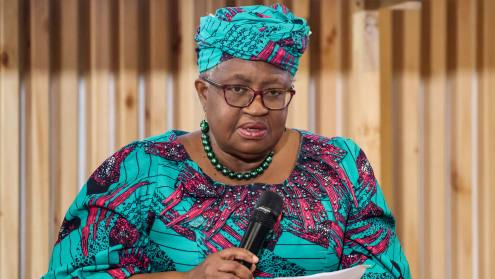At a glance
- Voluntary carbon credits give local communities a way to obtain a livelihood so they don’t go back to less sustainable practices
- Without a carbon price, the world cannot achieve the 1.5°C target set out in the Paris climate agreement
- The root cause of climate change, fossil fuels, is still not being addressed
Can the World Bank bring greater transparency and change negative perceptions of voluntary carbon markets? Ajay Banga, the bank’s president, is certainly going to give it a good try, with the World Bank certifying voluntary carbon credits for forestry in an effort to guarantee their environmental and social quality.
The World Bank’s voluntary credit market for forestry includes 126 million credits from 15 countries, which could earn up to $2.5bn in the right market conditions. The majority of the proceeds from the sale of these credits is expected to go back to the communities aligned on those habitats.
“These are forestry-related credits in countries where we’ve been involved in projects on the ground,” said Mr Banga in a fireside chat with the Financial Times at COP28. “We can do jurisdictional audits to ensure their environmental cleanliness and social audits to ensure the money goes to communities.”
Ahead of COP28 in Dubai, Mr Banga told The Banker’s editor Joy Macknight that if you do not give local communities a way to obtain a livelihood they will go back to less sustainable practices such as deforestation. “We have to find a way to get out of this cycle. That is what we are trying to certify,” he said.
The World Bank’s certification of voluntary carbon credits for forestry is designed to get money flowing to countries with natural carbon sinks such as those in Indonesia, says Mr Banga, which are working to repurpose mangrove plantations, adding 700,000 hectares of mangrove, which could create a 60m-tonne absorption of carbon over the coming decade or two.
Mr Banga told The Banker the World Bank had five or so companies that were hopefully ready with audits, another 10 in the pipeline and 47 in total who had agreed to work with the bank. “If we can get the first five going, we get tens of millions of carbon credits, we get $100m-plus in five years from those countries. If I can get a value on a carbon exchange of some $15 or $20 — some people say it should be higher — let’s start with $20, and that money starts flowing to Indonesia, and the DRC and Mozambique and Ghana, we’ve changed the conversation about creating the right incentives for those communities.”
Mr Banga said people talk about carbon taxes as an alternative, but he added that it is very difficult in a democratic country to justify a carbon tax on a domestic citizen to send the money 10,000 miles away, where they cannot see and feel the result of their own efforts.
The European Bank for Reconstruction and Development’s latest Transition Report, which surveyed individuals in many of the economies it which it operates, found that while a large percentage (63%) of respondents either agreed or strongly agreed that climate change is real and are concerned about its consequences, only between 37% and 43% of people were willing to pay more tax in order to fight global warming, prevent biodiversity loss or reduce/prevent pollution.
Mr Banga said we have to be thoughtful how we create a voluntary carbon method. “I recognise it is not easy and we may make mistakes along the way,” he said. “But we’ll do it as transparently as possible, because the right answer is not to back away from the issue.”
Ahead of COP28, government and industry leaders from across the global south called for progress in accelerating the development of voluntary carbon markets. At the world’s first Global South Carbon Markets Conference to address funding for climate action, hosted in Riyadh in October, leaders called for action in a number of areas:
- All carbon credits must represent real and measurable emissions reduction or removal. Integrity is central to building confidence. The industry would benefit from a universally accepted set of standards.
- Harmonisation is needed on carbon credit methodologies in relation to Article 6.4 of the Paris Agreement.
- Consistent accounting, tax and legal treatment would encourage demand.
- Fair benefit sharing with local communities is a must. Ensuring appropriate dividends to communities is not only equitable but may also encourage engagement, which ultimately increases a project’s chance of success.
- Voluntary carbon markets present an opportunity to build new south-south corridors, bringing together demand and supply, as the balance of climate action shifts.
- Public-private sector co-operation would help get funds into the hands of communities best positioned to execute climate action projects.
A joint framework aimed at ensuring the integrity of voluntary carbon markets was announced at COP28. On the supply side, six carbon crediting programmes (responsible for more than 90% of carbon credits) announced they will collaborate within the new framework.
The Commodity Futures Trading Commission also released draft rules for carbon credits traded on exchanges. The proposed guidance outlines factors for an exchange to consider in connection with contract design and listing to help advance the standardisation of voluntary carbon credit derivative contracts in a manner that fosters transparency and liquidity, accurate pricing and market integrity.
According to McKinsey, high-integrity carbon markets are an essential tool for reaching net zero. It says analysis from various organisations, including the Taskforce on Scaling Voluntary Carbon Markets and the Glasgow Financial Alliance for Net Zero, shows that up to 9 gigatonnes of CO2 equivalent of the 20 to 24 gigatonnes of emissions reductions required by 2030 to limit warming to 1.5°C could be supported by “high-integrity project-based carbon markets”. McKinsey says this includes both voluntary and “country-to-country” carbon markets covered by Article 6, where negotiations are ongoing.
Article 6 of the Paris climate agreement allows countries to voluntarily co-operate to reach more ambitious reduction targets by exchanging carbon credits.
Read more
Carbon pricing is also gaining momentum at COP28, with IMF managing director Kristalina Georgieva saying during a fireside chat with the Financial Times that a carbon price has the potential to raise revenues in a way that is equitable, because the more you consume or pollute, the more you pay, and therefore the greater the incentive to decelerate decarbonisation.
“We are finally at the cusp of moving towards private public money genuinely giving us the impact that is necessary. No more blended finance as a term. It is a reality,” she said.
Without a carbon price, Ms Georgieva said we cannot achieve the 1.5 °C target. However, according to the IMF’s own calculations, while the emissions price in the EU has risen above €50 a tonne, the global average price is only $3 a tonne, well below the global carbon price of about $75 a tonne needed to keep global warming safely under 2°C.
But while advances on voluntary carbon markets and carbon pricing are being made at COP28, many NGOs are doubtful whether significant progress will be made on phasing out fossil fuels, which are the biggest contributor to climate change.
In his fireside chat with the Financial Times, Mr Banga, who is attending his first COP, said if he knew the answer as to when we could end fossil fuels, he would have been there 15 years ago. He knows it entails increasing the mix of renewables, but he said climate change is not just energy. “In the global south, climate change is rainfall, soil degradation, loss of biodiversity. We have to focus on everything,” he said.
Richard Brooks, climate finance director at NGO Stand.earth, says while it was encouraging to hear on the first day of COP that the loss and damage fund had received more cash commitments, with the science pointing towards a 1.5°C overshoot, he says it does not feel like we’re doing what we need to do. “We’re basically admitting that we’re going to have increased damages and we’re going to have to put more money into mitigation, but we’re still not addressing the root cause in the way that we need to,” he says.
With the publicity surrounding the potential conflicts of interest by Sultan al-Jaber, president-designate for COP28 who also heads up Abu Dhabi’s National Oil Company, the sheer number of oil and gas delegates present as well as the financial institutions backing them, Mr Brooks says he is not feeling particularly hopeful.








